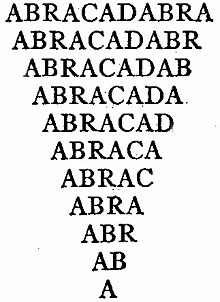
Abracadabra is a magic word, historically used as an apotropaic incantation on amulets and common today in stage magic. It is of unknown origin.
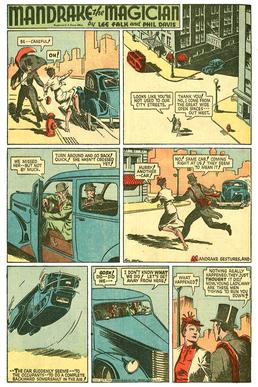
Mandrake the Magician is a syndicated newspaper comic strip, created by Lee Falk before he created The Phantom. Mandrake began publication on June 11, 1934. Phil Davis soon took over as the strip's illustrator, while Falk continued to script. The strip was distributed by King Features Syndicate.
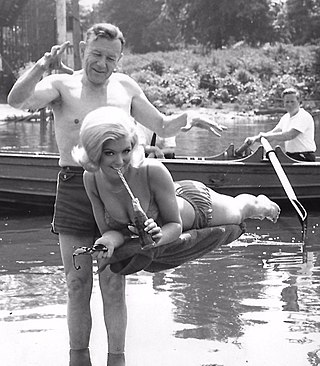
Robert Harbin was a South African-born magician and author. He is noted as the inventor of a number of classic illusions, including the Zig Zag Girl. He also became an authority on origami.

An incantation, a spell, a charm, an enchantment, or a bewitchery, is a magical formula intended to trigger a magical effect on a person or objects. The formula can be spoken, sung, or chanted. An incantation can also be performed during ceremonial rituals or prayers. In the world of magic, wizards, witches, and fairies are common performers of incantations in culture and folklore.

"Ali Baba and the Forty Thieves" is a folk tale in Arabic added to the One Thousand and One Nights in the 18th century by its French translator Antoine Galland, who heard it from Syrian storyteller Hanna Diyab. As one of the most popular Arabian Nights tales, it has been widely retold and performed in many media across the world, especially for children.

Albert Sidney Fleischman was an American author of children's books, screenplays, novels for adults, and nonfiction books about stage magic. His works for children are known for their humor, imagery, zesty plotting, and exploration of the byways of American history. He won the Newbery Medal in 1987 for The Whipping Boy and the Boston Globe–Horn Book Award in 1979 for Humbug Mountain. For his career contribution as a children's writer he was U.S. nominee for the biennial, international Hans Christian Andersen Award in 1994. In 2003, the Society of Children's Book Writers and Illustrators inaugurated the Sid Fleischman Humor Award in his honor, and made him the first recipient. The Award annually recognizes a writer of humorous fiction for children or young adults. He told his own tale in The Abracadabra Kid: A Writer's Life (1996).
Abby Cadabby, mostly referred to as just Abby, is a Muppet character on the PBS/HBO children's television show Sesame Street, performed by Leslie Carrara-Rudolph. On August 14, 2006, Abby made her debut in the first episode of Sesame Street’s 37th season, when she moved into the neighborhood and met some of the Street's residents. On the day of her debut, her wand broke; Big Bird told her to take her wand to the Fix-It Shop where Maria would fix it. Season 40 features her CGI animated recurring segments titled Abby's Flying Fairy School which was adapted into a proper spin-off. She is also currently the host of another spin-off Abby's Amazing Adventures, with her stepbrother Rudy, which debuted in 2018.
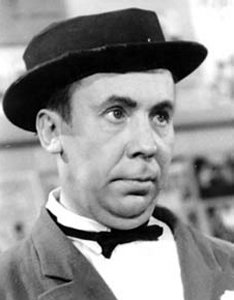
Martti "Masa" Elis Niemi was a Finnish actor, comedian, musician and entertainer. He is best known from his role as Pätkä in the Pekka and Pätkä films.

In ceremonial magic, a magical formula or a word of power is a word that is believed to have specific supernatural effects. They are words whose meaning illustrates principles and degrees of understanding that are often difficult to relay using other forms of speech or writing. It is a concise means to communicate very abstract information through the medium of a word or phrase.

Yo Gabba Gabba! is a children's musical television series created by Christian Jacobs and Scott Schultz and developed by Kay Wilson Stallings. The series is about five costumed toys come-to-life and their friend DJ Lance Rock. It is co-produced by the Magic Store and Wildbrain Entertainment. Its first episode premiered on Nickelodeon on August 20, 2007, as a part of its Nick Jr. block. Its original run ended on November 12, 2015.
Benjamin the Elephant (1988–2002) is an animated children's television show produced by Kiddinx Studios in Berlin. The show is based on audio stories by Elfie Donnelly. The audio series has been running since 1977 and has 142 stories as of 2019. On the show, the eponymous main character resides at the Newtown Zoo, with friends Otto and Stella. The adventures Benjamin gets involved in often require slipping into various roles, learning new jobs, or discovering new and distant places.
A few months after the 1969 premiere of the children's television program Sesame Street in the U.S., talks began in the United Kingdom to broadcast the programme or develop a co-production on British television. The idea was controversial at the time; the BBC was opposed to it, and ITV was reluctant. Response from parents, educators, and television officials to the show was varied, ranging from distaste to acceptance. After much public debate, the BBC chose not to air Sesame Street for several reasons, including the show's educational methods, its creation for American audiences, and the UK's long history of quality educational television programmes for young children. ITV, after much research, including a report entitled Reactions to Sesame Street in Britain, 1971, chose to air Sesame Street on a limited basis. It then switched to Channel 4 in the 1980s and aired there until 2001, when it was pulled from its regular schedule, replaced by The Hoobs.

Magi: The Labyrinth of Magic is a Japanese fantasy adventure manga series written and illustrated by Shinobu Ohtaka. It was serialized in Shogakukan's shōnen manga magazine Weekly Shōnen Sunday from June 2009 to October 2017, with its chapters collected in 37 tankōbon volumes. In North America, the manga is licensed for English release by Viz Media.

Patrick "Pat" Page was a stage magician born in Dundee, Scotland. He became a professional magician at the age of 26 and worked at Davenport's magic shop for fifteen years. In 1950, he married Margaret Manzie, who died in 2003. Pat was the youngest of six siblings. He left behind his daughter Janette, son Jeremy and Grandson Robert.

Witchy Pretty Cure!, also known as Maho Girls PreCure!, is a Japanese anime television series by Toei Animation and the thirteenth installment in Izumi Todo's Pretty Cure metaseries, featuring the eleventh generation of Cures. The series, directed by Masato Mitsuka and written by Isao Murayama with character design by Emiko Miyamoto, aired on ANN television stations between February 2016 and January 2017, succeeding Go! Princess PreCure in its timeslot, and was succeeded by Kirakira Pretty Cure a la Mode. The series' main topic is friendship, while its motifs are magic and jewelry. An adult animated sequel series has been announced by Toei, and is set to premiere in 2024 on ANN's Animazing!!! programming block.
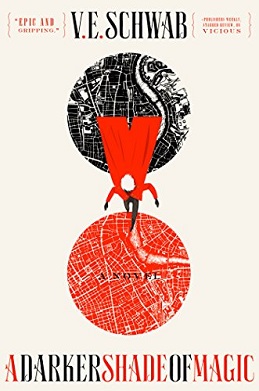
A Darker Shade of Magic is an adult fantasy novel by American author V.E. Schwab published by Tor Books in 2015. It is the first installment of the Shades of Magic trilogy.
